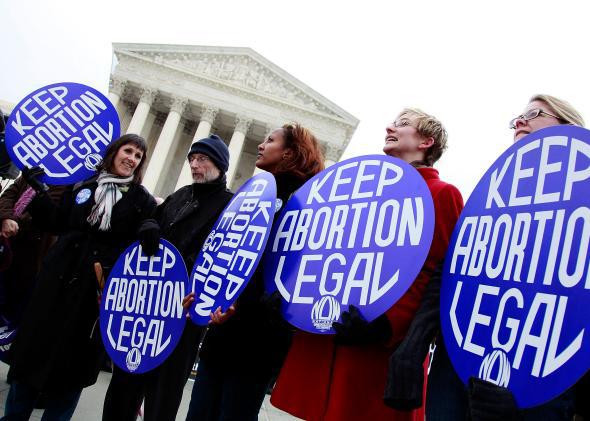The past few weeks have seen a spate of articles about the downsides of abortion and contraception. There was Ann Friedman’s “Why the Abortion Pill Didn’t Change Everything” in the Cut—an explanation that included the fact that some women who take mifepristone experience a pain “so intense that it’s hard to really remember.” Then the Cut’s parent publication, New York Magazine, ran a harrowing cover story recounting 26 women’s abortion experiences—including a teenager who “wanted to keep the baby” but was pressured by her boyfriend to terminate, and a mother of two who says her abortion provider was “grotesque” and describes overwhelming guilt and shame about her decision. Finally, this month’s Elle features a story by Virginia Sole-Smith about the drawbacks of the birth control pill, which for some women include blood clots and depression. (For Sole-Smith, the pill’s effects masked an undiagnosed case of endometriosis for years.)
You’ll notice that Elle and New York aren’t rightwing, religious publications. In fact, a sizeable portion of their readers and writers probably consider themselves feminists and support reproductive freedom. It may seem counterproductive for progressive publications to be sharing stories of abortion- and contraception-related woe and trauma at a time when states like Texas and Oklahoma are putting our reproductive rights at risk. In fact, it’s a great development.
“I regret my abortion” and “the Pill is dangerous” stories have traditionally been the stuff of antiabortion propaganda campaigns. As my colleague Amanda Hess wrote a few months ago, “Pro-life rallies are awash in pairs of tiny baby shoes, strung together to represent the women—or the pro-life organizers—who feel they made the wrong choice. … Women who regret their abortions are encouraged to tell their stories in these spaces.” And fundamentalist Christians trump up the ostensible link between birth control pills and cancer in the service of promoting abstinence. A newsletter distributed by Christian Voices for Life contains a prayer that begins, “Dear Jesus, Please help women to be informed about the serious health risks of oral contraceptives.” (Unfortunately, some self-proclaimed feminists have also exaggerated the pill’s risks.)
As a result, pro-choice women have hesitated to share stories about regretted abortions, or about the unpleasant side effects of the pill, for fear of inadvertently giving fodder to pro-lifers and anti-sex activists. In her Elle article, Sole-Smith writes, “It feels dangerous to complain about the Pill when retro-minded legislators in every state and most branches of the federal government are determined to chip away at women’s right to choose.” A woman who wished she hadn’t had an abortion wrote an apologetic essay in Feministing a few years ago, afraid that her emotional pain made her a bad feminist. “Maybe it’s not okay that the pain of abortion still hurts, four years later,” she wrote.
It helps no one when women feel that their feelings about their own personal experiences with abortion and contraception are somehow “not okay.” Which is why it’s wonderful that New York and Elle are reclaiming these stories from religious conservatives. Some women are pressured into getting abortions, and not every abortion provider is skilled and compassionate. Some women get depressed when they take the pill, and some experience agony during their medication abortions. Abortion and contraception can be good or bad for the patient, depending on her biology, her socioeconomic circumstances, her provider. To acknowledge these realities is to treat reproductive healthcare like any other kind of medical care—and isn’t that what feminists have been fighting for all along?
It helps no one when women feel that their feelings about their own personal experiences with abortion and contraception are somehow “not okay.” Which is why it’s wonderful that New York and Elle are reclaiming these stories from religious conservatives. Some women are pressured into getting abortions, and not every abortion provider is skilled and compassionate. Some women get depressed when they take the pill, and some experience agony during their medication abortions. Abortion and contraception can be good or bad for the patient, depending on her biology, her socioeconomic circumstances, her provider. To acknowledge these realities is to treat reproductive healthcare like any other kind of medical care—and isn’t that what feminists have been fighting for all along?
